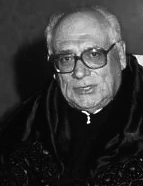

University professor, literary critic and historian of literature. Of humble origins, Aníbal de Castro (AC) attended the D. João III Normal Secondary School, where, in 1955, he completed the complementary course (paragraph a ). He then enrolled at the School of Arts and Humanities in Coimbra. There, he obtained all his academic degrees and spent most of his time lecturing and researching. He was one of the most respected and influential representatives of the philological school that goes back to Carolina Michaëlis de Vasconcelos, continued by Joaquim Mendes dos Remédios and Álvaro Júlio da Costa Pimpão .
Apart from the differences in time and idiosyncrasy, one could say that this school was grounded in a positivist view of history and guided by a civic and institutional ethic: to make Portuguese literature known, with as much precision as possible, through the study of texts and contexts. In fact, this purpose closely follows a broad movement that emerged in European universities towards the end of the 19 th century, committed to building a history of Western civilisation based on linguistic and literary phenomena.
Directly or indirectly, AC should be considered one of the first and most important proponents of comparativism in the history of Portuguese literature. Having started his academic career in 1961 when he published his undergraduate dissertation on the influence of Balzac in Portuguese literature, AC would stand out in his generation through a broadening of horizons that resulted from his wide and deep knowledge of Romance and Classical literature , especially Latin literature. This knowledge not only allowed him to research sources in the most conventional sense of the word but also led him to fruitful intertextual approaches in the field of reception or the so-called ‘literary fortune’ of authors and the periods or movements that framed them.
This work is financed by national funds through FCT - Foundation for Science and Technology, I.P, in the scope of the projects UIDB/04311/2020 and UIDP/04311/2020.
